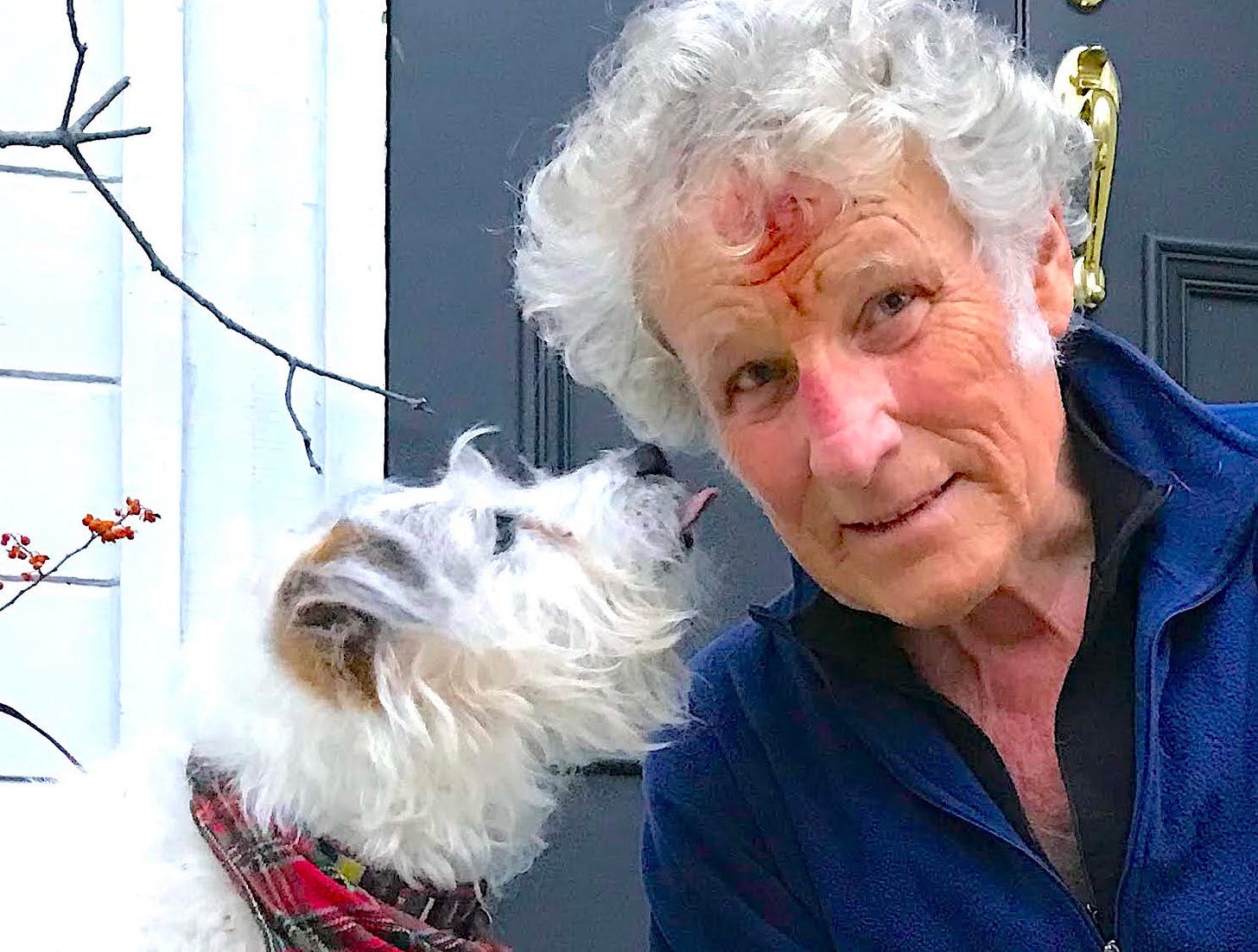The Budster was always good therapy—as here after I tripped on autumn leaves and fell while running.
So, as your ecotherapist, I’d like to understand how long you’ve felt this anxiety. Does it feel like homesickness when you’re still at home? Do you feel it comes from your deep-rooted ecological instincts? Does the place where you live and which you love seem under assault? Let’s pick up where you were telling me how you felt when you saw your kids’ flooded playground . . .
. . . Okay, same time next week?
Such sessions are probably taking place today, someone lying on a couch, seeeking treatment for anxiety about climate change. Today it’s an official and fast-growing branch of medicine! Online searches for ‘climate anxiety’ jumped 565 percent from 2020 to 2021. A Google search today reports 327,000 results for the phrase.
There’s even an online Directory of Climate-Aware Therapists!
Buddy and I explored the hidden impact of climate on children’s mental health in our very first ClimateDog newsletter eighty-three issues ago. It’s no longer, as we called it, an “invisible epicemic.” There are several reasons for its explosive growth.
Wildfires, drought, flooding, air pollution, and other physical threats from climate change are more extensive and frequent. They’re getting broader media coverage.
The term climate change is being made more scary. At least one news outlet, The Guardian, changed its official style guide to favor the terms ‘climate emergency, climate crisis, or climate breakdown’ over ‘climate change.’ [University of Colorado Boulder]
In the media, climate change is no longer just a science story. We read about it on the political, economic, societal and cultural pages.
Some schools have added climate change to their syllabuses, but they’re mostly teaching the scary stuff. A whole generation of students will graduate with climate anxiety and no preparation to deal with it. [Columbia University]
Psychologists to the rescue?
It’s no surprise: as soon as climate anxiety is announced as a thing, there’s a rush to offer help.
The Climate Psychology Alliance is compiling a directory of licensed mental health practitioners who qualify as "climate-aware therapists” and who are “ready to support clients across North America with the mental health impacts of climate change.”
In 2020 Ecopsychology, the first peer-reviewed journal dedicated to “the relationship between environmental issues and mental health and well-being,” was published. M.I.T. Press has published a book of the same name.
Other Resources
For around $5,000, therapists and healers can earn a Climate Psychology Certificate.
The American Psychological Association has been producing studies on human responses to natural and technological hazards, among them attempts to understand why people do or do not take action.
For those of us who are less interested in a couch session and would prefer Forest Bathing or Inspiration Practices, the EcoPsychology Initiative stands ready to meet our needs. Or we can listen to the podcast, Climate Change and Happiness.
The Good Grief Network “brings people together to metabolize collective grief, eco-distress, and other heavy emotions that arise in response to daunting planetary crises.” The group coordinates peer-to-peer support groups that help folks recognize, feel, and process their heavy emotions, so that these feelings may be transformed into meaningful action. They offer a 10-step program to “Resilience & Empowerment in a Chaotic Climate.”
The future of climate grief
Dan Quisenberry, right-handed relief pitcher and bon mot, once told us that “The future is much like the present, only longer.” Climate change is proving him wrong.
Many of us see a lot of aspects of climate, yet we are not yet feeing the ‘change’ part. For others the climate crisis is already here. As we gradually envision how the physical changes are going to create yet-unseen deterioration in our bank accounts, our daily lives, our emotions and our sense of self, it’s perfectly natural to become anxious, to grieve. As natural as a Katrina victim mourning their lost home, an Inuit watching the ice disappear, or a Central American farmer watching the rains stop.
It’s as natural as mourning for Buddy, our sensible and loving research assistant.
LEARN, THINK, ACT
Proactive thinking can be the biggest weapon against anxiety. My book, Climate-proof Your Personal Finances: how (and where) to safeguard your family budget and lifestyle, describes 100 actions and attitude shifts that can reduce our pain and stress from climate change. Buddy and I conclude that
a serious effort to redesign our family’s life in the face of warming could trigger items high on the list of Life’s Most Stressful Events. These include changes to our financial state and living conditions, plus our personal habits, place of residence, social activities, and school.
The emotional steps needed to help free family members from 20th century spending and lifestyle habits, in order to create a new self-image and renewed morale, can take months, maybe years. If we begin now imagining, exploring, and discussing our options, that moment when our family is ready to change location or lifestyle or attitude will come sooner—and less painfully. We’ll be ready to shift our lives away from danger.





